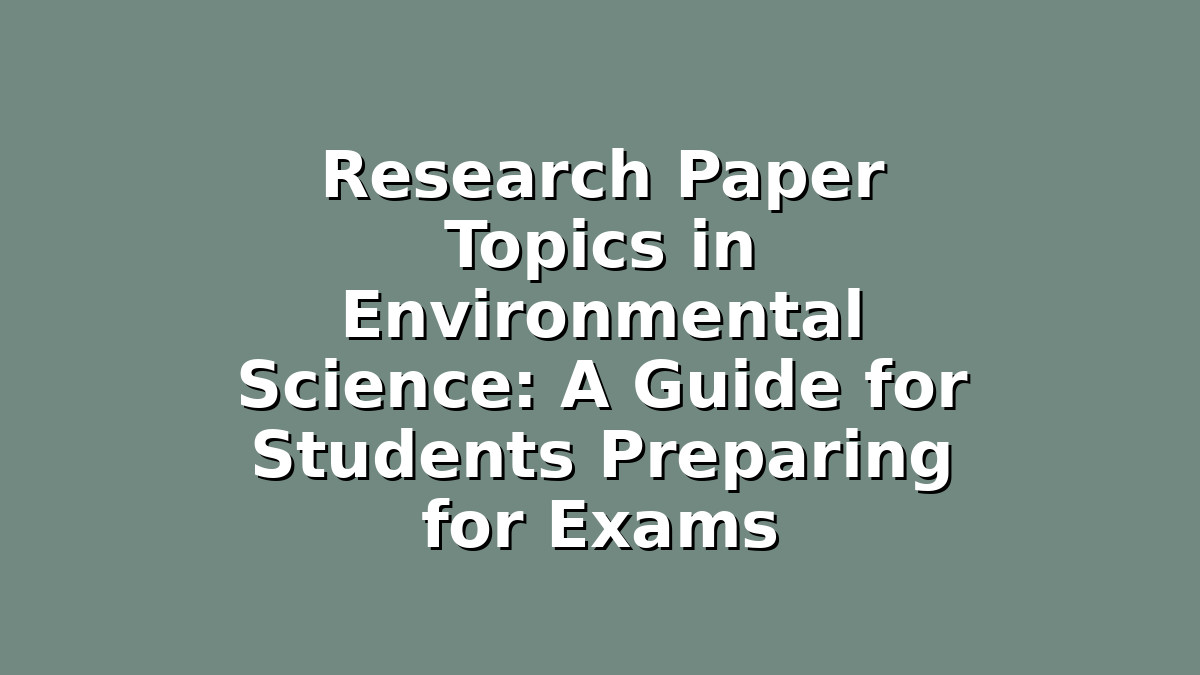Environmental science is a dynamic and vital field that explores the complex interactions between humans and the natural world. For students preparing for exams or working on research papers, choosing the right topic can be both exciting and challenging. Selecting a compelling, relevant subject not only makes your study process more enjoyable but also helps produce a high-quality paper that can impress your teachers and peers.
In this article, we’ll explore a variety of research paper topics in environmental science tailored for students, along with effective study tips to help you prepare thoroughly and confidently. Whether you’re just starting your research or looking for ways to organize your study sessions, this guide aims to support your academic journey in environmental science.
1. Choosing the Right Research Paper Topic in Environmental Science
The first step toward writing a successful research paper is picking a topic that balances your interests, the scope of your assignment, and available resources. Environmental science offers a vast range of subjects, from climate change and pollution to conservation and sustainable development. Here are some tips for choosing an ideal topic:
– Identify Your Interests: Reflect on which areas of environmental science intrigue you most. Are you passionate about wildlife conservation, renewable energy, or environmental policies? Your enthusiasm will motivate you throughout the research process.
– Consider the Scope: Avoid topics that are too broad or too narrow. For example, instead of “Climate Change,” you could focus on “The Impact of Climate Change on Coral Reefs” or “Climate Change Adaptation Strategies in Urban Areas.”
– Check Resource Availability: Ensure there are enough academic articles, case studies, and credible sources related to your topic. This will make your research more manageable and comprehensive.
– Align With Exam Requirements: If your research paper is part of an exam or coursework, review the guidelines carefully. Choose a topic that fits the criteria and grade expectations.
Here are some engaging environmental science research paper topics to get you started:
– Effects of Plastic Pollution on Marine Ecosystems
– The Role of Renewable Energy in Reducing Carbon Emissions
– Urban Green Spaces and Their Impact on Air Quality
– Deforestation and Its Consequences for Biodiversity
– Water Scarcity and Sustainable Water Management Practices
– Environmental Policies and Their Effectiveness in Combating Climate Change
2. Study Tips for Researching Environmental Science Topics
Once you have selected your topic, it’s essential to approach your research systematically to build a strong foundation for your paper. Environmental science often involves interdisciplinary concepts, so organizing your study time efficiently will help you cover all necessary aspects.
– Create a Study Plan: Break down your research into manageable tasks. Allocate time to gather sources, read articles, take notes, and outline your paper. Using a planner or digital calendar can keep you on track.
– Use Credible Sources: Focus on peer-reviewed journals, books, government reports, and reputable environmental organizations’ publications. Websites ending in .edu, .gov, or .org usually offer reliable information.
– Take Effective Notes: Develop a note-taking system that works best for you, such as digital apps, index cards, or annotated PDFs. Highlight key facts, statistics, and quotes that support your arguments.
– Understand Key Concepts: Environmental science covers topics like ecosystems, sustainability, pollution, and climate science. Make sure you grasp foundational concepts to explain complex ideas clearly.
– Incorporate Visual Aids: Charts, graphs, and maps can enhance your understanding and presentation. They are especially helpful for illustrating trends in pollution levels, temperature changes, or species populations.
3. Writing and Revising Your Environmental Science Research Paper
Writing the paper is where all your preparation comes together. Clear writing and thorough revision are crucial to delivering a polished, insightful research paper.
– Draft an Outline: Begin with a clear structure: introduction, body paragraphs (each covering a specific point), and conclusion. This framework helps keep your writing focused and logical.
– Write Clearly and Concisely: Use straightforward language to explain scientific concepts. Avoid jargon unless you define it, and make sure each paragraph supports your main thesis.
– Support Your Claims With Evidence: Back up your statements with data and citations from your research. This adds credibility and depth to your paper.
– Use Proper Citation Styles: Familiarize yourself with citation formats like APA, MLA, or Chicago, as required by your instructor. Proper citations prevent plagiarism and demonstrate academic integrity.
– Revise and Edit: After completing your first draft, take a break before revising. Check for clarity, coherence, grammar, and spelling errors. Reading your paper aloud can help catch awkward phrasing.
– Seek Feedback: Share your paper with classmates, teachers, or mentors. Constructive criticism can provide new insights and help improve your work.
Conclusion
Researching and writing a paper on environmental science can be a rewarding experience that deepens your understanding of critical global issues. By choosing a meaningful topic, organizing your study time effectively, and approaching your writing with clarity and care, you set yourself up for success. Remember, preparation and persistence are key — stay motivated and curious, and your efforts will shine through your research paper.
Good luck with your studies and exams! Environmental science is not just an academic subject but a path toward making a positive impact on the world.

Responses